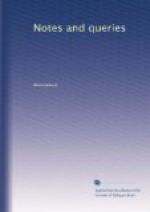“Monteith informs us, that during the Commonwealth, overtures were made on behalf of the Hebrews to the Parliament and Council of War, through the medium of two popular adherents of the parliamentarians; the Jews offered to pay for the privileges then sought by them, the sum of 500,000l.; several debates took place on the subject, but the ultimatum of the Puritans being 800,000l., the negotiation was broken off.”
The authorities cited on this point by the learned writer are, Monteith’s History of Great Britain, p. 473.; and Thurloe’s State Papers, vol. ii. p. 652.
On reference to Monteith, I find the following passage:—
“What is very remarkable in this is, that the Jews, who crucified the Son of God, by whom Kings reign, took then occasion of the conjuncture which seemed favourable to them. They presented a petition to the Council of War, who crucified Him again in the person of the King, His Vicegerent in the kingdoms over which God had set him. By their petition, they requested that the act of their banishment might be repealed and that they might have St. Paul’s Church for their synagogue, for which, and the library of Oxford, wherewith they desired to begin their traffic again, they offered five hundred thousand pounds, but the Council of War would have eight.”—Monteiths’s Hist. of the Troubles of Great Britain, p. 473.
I conclude that the author of the Status of the Jews, by omitting to notice the alleged desire of the Jews to obtain St. Paul’s Cathedral, considered that the acrimonious statements of Monteith were not borne out by accredited or unprejudiced authorities; for it is but justice to state, it has been admitted by some of our most eminent critics, that Mr. Egan’s book on the Jews displays as dispassionate and impartial a review of their condition in this country as it evinces a profundity of historical and legal research.
“H.M.A.’s” second question I am unable to answer, not being sufficiently versed in the religious dogmas of the Jews.
B.A.
Christ Church, Oxford.
* * * * *
Emancipation of the Jews (No. 25. p. 401.).—“MR. AUSTEN,” who inquires (p. 401.) about the Jews during the Commonwealth will do well to refer to a chapter on the Jews in Godwin’s History of the Commonwealth, and to Sir Henry Ellis’s notes on a remarkable letter describing a Jewish synagogue in London immediately after the Restoration, in the second series of his Letters; and in these two places he will, I think, find references to all known passages on the subject of Cromwell’s proceedings as regards the Jews.
C.H.
* * * * *




